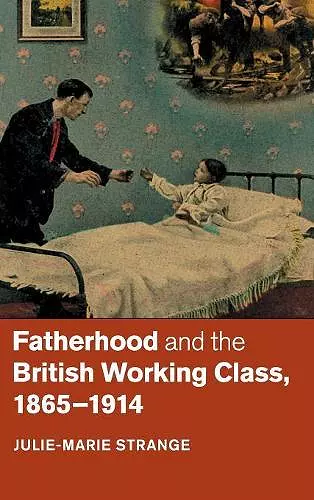Fatherhood and the British Working Class, 1865–1914
Format:Hardback
Publisher:Cambridge University Press
Published:19th Jan '15
Currently unavailable, and unfortunately no date known when it will be back
This hardback is available in another edition too:
- Paperback£30.99(9781107446861)

A pioneering study of Victorian and Edwardian fatherhood, investigating what being, and having, a father meant to working-class people. Based on working-class autobiography, the book challenges dominant assumptions about absent or 'feckless' fathers, and reintegrates the paternal figure within the emotional life of families. Locating autobiography within broader social and cultural commentary, Julie-Marie Strange considers material culture, everyday practice, obligation, duty and comedy as sites for the development and expression of complex emotional lives. Emphasising the importance of separating men as husbands from men as fathers, Strange explores how emotional ties were formed between fathers and their children, the models of fatherhood available to working-class men, and the ways in which fathers interacted with children inside and outside the home. She explodes the myth that working-class interiorities are inaccessible or unrecoverable, and locates life stories in the context of other sources, including social surveys, visual culture and popular fiction.
'This book is a major contribution to family history and British social history, which will be valued not only for its substantive findings, but for setting new standards in the interpretation of working-class autobiographies. The experience of fatherhood is brought vividly to life, in writing which is lucid and stylish.' John Tosh, University of Roehampton
'In this brilliant study Strange restores humanity to Victorian and Edwardian working-class fathers. She rightly argues that the social history of the family cannot adequately be told if fathers and fatherhood remain an absent presence. Through a sensitive, multi-layered reading of autobiographical accounts, Strange convincingly demonstrates that intimate histories of private life can be simultaneously poetic and political. A stunning achievement.' Jon Lawrence, University of Cambridge
'Julie-Marie Strange provides a long-overdue 'counter narrative' (as she calls it) to the standard story of the working-class father as 'failed' provider for wife and children. Focusing on the child's response to the intimacies of home life, this innovative study uncovers a wealth of new material which offers a much warmer, richer, and more personal understanding of the way fathers invested meaning - even laughter and comedy - in their everyday interactions with their families.' Valerie Sanders, University of Hull
'Julie-Marie Strange gives us a dynamic, contextual portrait of working-class fathers, through their own eyes and those of their children, which refuses all easy clichés about their parenting. Instead, Strange focuses on what gave fatherhood meaning - both having, and being, a father, across the early twentieth century. She is deeply attentive to, and respectful of, the mundane acts of care, material provision and ritual which make up the affective world of fatherhood. Never sentimental, Strange nonetheless re-enchants working-class fatherhood. [This book] provides a brilliant example of how both the history of emotions and of material culture might inform social history, and powerfully change the existing historical narrative.' Lucy Delap, King's College London
'Dr Julie-Marie Strange … scoured hundreds of contemporary souces - ranging from memoirs to music hall comedy lyrics - to test the traditional caricature of fathers in the 19th and early 20th century as strict, lacking affection and often brutal.' John Bingham, The Daily Telegraph
'The purpose of this delightful book is to both reassess and expand understanding of plebeian masculinity. The author reveals just how fathers and their children could and did create, experience, and sometimes even enjoy their own forms, sites, and languages of affective relationships. The careful exegesis of working-class autobiographies presented here allows readers to both broaden and deepen their understanding and appreciation not only of working-class fathers, in particular, but also of the British working-class family more generally. A most welcome contribution to the literature.' Choice
'This is a very impressive work of social history, characterized by a tremendous emotional intelligence that allows Strange to imbue the actors she discusses with real humanity in a few deft strokes.' Ben Griffin, The Journal of Modern History
'Excellent. … Strange's nuanced analysis of the emotional intracies of fathering ensures that fathers will certainly be actors in future feminist histories of families.' Ellen Ross, History Workshop Journal
ISBN: 9781107084872
Dimensions: 235mm x 158mm x 17mm
Weight: 500g
242 pages